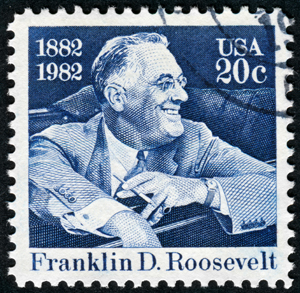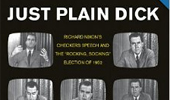Months before debate erupted over the concept of the “imperial presidency” and “executive orders,” Dr. Kevin Mattson was at the Roosevelt Institute in Ireland detailing a view that the power asserted by FDR and used by LBJ was undermined by the Vietnam War—and that liberals are unlikely to sustain its return.
Examining the presidents in the post-Vietnam era paints “a portrait of contemporary liberalism’s quandary and struggle,” says Mattson, Connor Study Professor of Contemporary History at Ohio University who serves as a faculty associate of the Contemporary History Institute.
“From the 1970s onwards, liberals faced a conundrum: Armed with a vision based upon the use of power and a martial and high-minded spirit of mobilization, there was now plummeting trust in and growing cynicism about executive power and war. America had entered the age of the post-imperial presidency,” he says.
Mattson delivered his remarks—“From the Politics of Hope to the Politics of Frustration: The FDR Legacy and the Quandary of Liberalism in Post-War America”—on Nov. 8 at the Roosevelt Institute conference on Progressivism in America: Past, Present, and Future at the at the University College Dublin’s Clinton Institute.
The Politics of Hope Begins
 The concept of presidential power was born with FDR’s New Deal and his big ideas. among them that Americans should “think of themselves as a ‘trained and loyal army’ solving domestic problems; that ‘interdependence on each other’ should push Americans beyond old-school economic individualism and laissez-faire; that positive freedoms (freedom to) now trumped negative freedoms (freedom from authority); that ‘every man has a right to life, … a right to make a comfortable living’ under ‘an economic constitutional order’; that a faith in governmental action and the ideal of ‘enlightened administration’ would lead the country to better times,” Mattson said.
The concept of presidential power was born with FDR’s New Deal and his big ideas. among them that Americans should “think of themselves as a ‘trained and loyal army’ solving domestic problems; that ‘interdependence on each other’ should push Americans beyond old-school economic individualism and laissez-faire; that positive freedoms (freedom to) now trumped negative freedoms (freedom from authority); that ‘every man has a right to life, … a right to make a comfortable living’ under ‘an economic constitutional order’; that a faith in governmental action and the ideal of ‘enlightened administration’ would lead the country to better times,” Mattson said.
“Ordinary citizens saw FDR—sometimes as God-like, sometimes like a religious figure saving them from purgatory, sometimes like a loving, doddering father, sometimes like a rich uncle who held pots of money ready to distribute…. His clenched, up-arching chin and broad grin symbolized government itself,” Mattson explained.
The legacy of FDR’s One Hundred Days was an explosion of legislation. “William Leuchtenburg summarized it this way: the country had committed to ‘an unprecedented program of government-industry cooperation; promised to distribute stupendous sums to millions of staple farmers; accepted responsibility for the welfare of millions of unemployed; agreed to engage in far-reaching experimentation in regional planning; pledged billions of dollars to save homes and farms from foreclosure; undertaken huge public works spending; guaranteed the small bank depositions of the country; and had, for the first time, established federal regulation of Wall Street.’
“In 1935, recognizing an election was just around the corner, and reacting against an increasingly hostile Supreme Court, FDR oversaw a bold reaffirmation of liberal legislation: Social Security, the Works Progress Administration, the Wagner Act (granting, without hesitation, collective bargaining rights), and a ‘Wealth Tax Act.’” Mattson continued.
The Imperial Presidency Is Born
“Without doubt, the president who merged FDR’s vision of the executive and the cause of liberalism was LBJ,” Mattson said.
“Johnson loved using power…. It was power that got things done for others. Johnson pushed the Civil Rights Act—crafted by his dead predecessor—that had lingered through the summer of the March on Washington up to the time of Kennedy’s assassination. LBJ came at it with a moral sense of righteousness Kennedy lacked…. But where LBJ really carried FDR’s torch of liberalism was when, just two months after inheriting the presidency, he committed the country to an ‘unconditional war on poverty.'”
LBJ’s first nine months of 1965 harkened back to FDR’s Hundred Days, Mattson said.
“He offered up the Economic Opportunity Act that set up work-training programs for the unemployed (Job Corps), created Community Action Programs (CAP) that would engage citizens at local level to combat poverty, generated Volunteers in Service to America (VISTA) (another grassroots initiative), and provided loans to those businesses that helped put the unemployed back to work. Much of this would falter. But much else of the war wouldn’t: Head Start, Legal Services, and the making permanent of Food Stamps. Or consider the grandest outcomes of all: the very popular Medicare, intended for the aged and a program built upon Social Security, and the ‘piggybacking’ of Medicaid, a less popular program for the poor.
“And yet, all the while, many liberals watched LBJ with unease. Some of it had to do with LBJ’s style and character disposition,” Mattson noted.
“And there was also a little thing called the Vietnam War that made numerous liberals break from his administration and that also tweaked Johnson’s inbred paranoia. The war, like the Great Society and Civil Rights legislation, was rushed. The Tonkin Gulf Resolution gave Johnson carte blanche without declaring war. Johnson believed Congress should not ‘sanction’ but rather ‘support the war.’ As he rolled out ‘Rolling Thunder’ and agreed to escalate troop numbers from 1965 onwards, Johnson grew increasingly suspicious about dissent within his own ranks and society at large. The ‘imperial presidency’ was born,” Mattson said.
The Age of the Post-Imperial Presidency
America entered the age of the post-imperial presidency in the 1970s with a “plummeting trust in and growing cynicism about executive power and war,” Mattson says.
“Carter ran as a populist and ‘outsider’ in 1976. But it meant that he never really squared himself with the halls of power in D.C.,” said Mattson.
“His highest ambition was to create a National Energy Policy,” Mattson said. But “he found a language of sacrifice—often nurtured by war tropes—to fail in the face of cynicism of the so-called ‘me decade.’”
‘The Era of Big Government Is Over’
Bill Clinton? “No liberal, Bill Clinton was a self-professed centrist,” said Mattson.
“Clinton aimed to win back Middle America to the Democratic Party. And he announced the end of LBJ’s Great Society by proclaiming, ‘The era of big government is over.’”
Mattson said Clinton romanticized about political power. “His mind bubbled with ideas about welfare reform, job retraining programs, and public service (the ambitions outlined in Putting People First).” But when health care failed, Clinton’s vision of leadership shifted. “What replaced it was policy constructed around polling.”
A Refuge from Traditional Representative Government
“Barack Obama? Consider the biographical details: He came of age not only after the golden era of the civil rights movement (a member of the so-called “Joshua Generation”) but during the “malaise” decade and the Reagan era. After studying political theory, he did a stint in community organizing—a refuge from traditional representative governmental structures. He learned the art of listening to citizens to mobilize them at the grassroots level (some characterize community organizing as anti-politics, more direct than mediated or representational action).
“Consider also that Barack Obama assumed the presidency on the heels of George W. Bush who had tried to reinvigorate the ‘imperial presidency’ of yore. The biographical details and the timing add up to a presidency hemmed in not just by a louder conservative movement but by its own sense of limits.”
Mattson described Obama as more JFK than LBJ. He displayed “a knack for powerful rhetoric on the campaign trail…but often turned technocratic or aloof when it came to governing as president (in contrast to FDR’s fireside chats).”
Even Obama’s signature Affordable Care Act—stymied by a frustrating launch at the time of Mattson’s talk in November after barely passing—”was no return to boldness like FDR’s in 1935,” Mattson continued.
Long-term Philosophical Distrust in Power
“So here we are with the contemporary quandary of liberalism: Liberals desire bold action on an array of issues but also fear the abuses (and the historical paranoia that abuses prompt) of executive power. The language of national sacrifice based around analogies with war-time emergency consistently fall on deaf ears. This is rooted not just in historical experience (Vietnam, Watergate, Clinton Scandal, Iraq) but in a long-term philosophical distrust in power…. When honest, liberals admit that power can corrupt (not that it always does). As much as liberals need to defend unified action to tackle problems, they must also protect procedural justice against the over-reach of power.
“Because of this, I think the future of liberalism will be tentative, humility-fueled, focused on backcourt dribbling and defense of existing programs, worried about overstretch, hemmed in, and likely reactive rather than visionary or glowing with the language of war. Like Obama’s foreign policy, it might cite big principles – democracy and calls against genocide—but will be wary of action, because action can sometimes do more harm than good and trap us in something we really can’t finish. Maybe we should call this version of post-war liberalism Clinton-Obamaism for lack of a better term. It’s a liberalism that doesn’t believe – as George W. Bush’s henchmen did – we can or should overcome a ‘Vietnam legacy.’ A liberalism chastened by history. A liberalism weakened by our predecessors’ mistakes and misjudgments. A liberalism that moves where it can with caution. It is necessarily more reactive, aware of “backlash” and the ironies of history.
“And it’s a liberalism that faces the overwhelming fact of American political life today: That confidence in government continues to plummet,” Mattson concludes, calling it, for liberals, “a politics of frustration.”



















One Comment